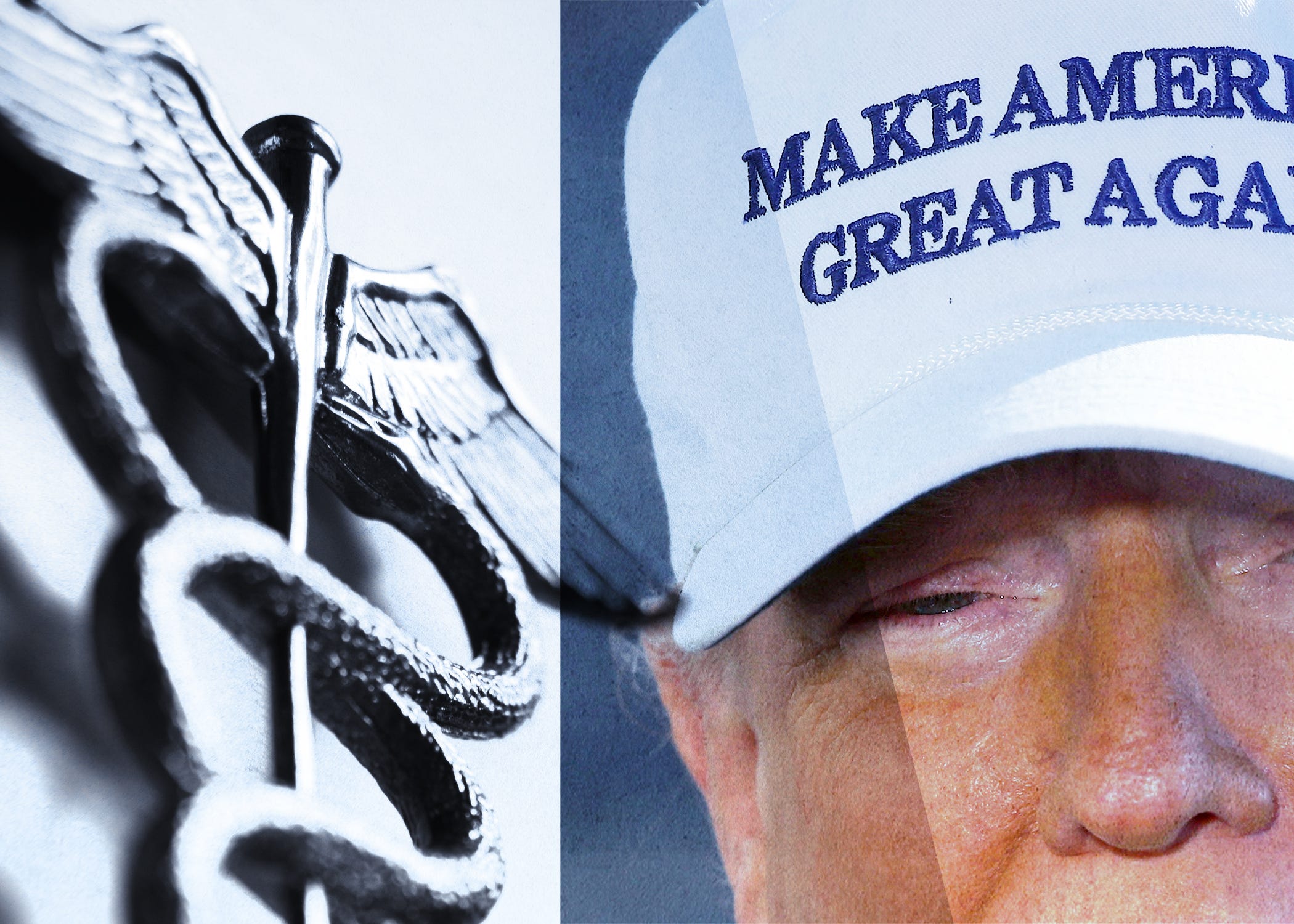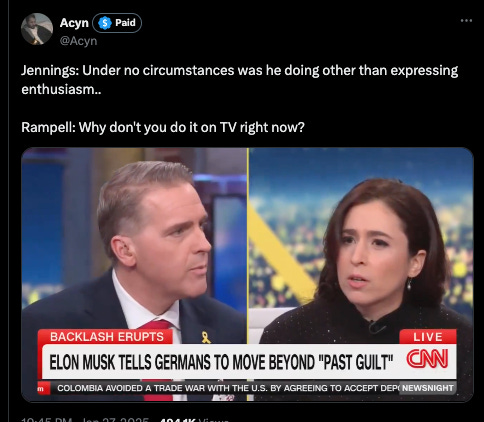Move Fast and Break the GovernmentA blizzard of regulations; a power grab over federal funds; and the hollowing out of our nation’s public workforce. It’s just week two.We haven’t really touched on the DeepSeek AI news, partially because, like everyone else, we’re still working through exactly what it means. But looking at the state of our country right now, it seems our problem isn’t new strides in artificial intelligence but a dearth of organic intelligence. Happy Tuesday. It’s Chaosby Sam Stein Whatever your political disposition, you have to give Donald Trump credit for one thing: He’s not wasting time. On Monday alone, the Department of Justice fired career prosecutors involved in the special counsel case against Trump, foreign aid was put on hold and USAID officials were put on leave (one official familiar with the process told us that institutional support contractors were being furloughed, too), the U.S. military began to implement new personnel policies and sent forces to the southern border, ICE ramped up operations and banking regulators rescinded 200 or so job offers. More is yet to come. A letter from the Office of Management and Budget, obtained last night by The Bulwark, instructed federal agencies that they were to “temporarily pause all activities related to obligation or disbursement of all Federal financial assistance,” effective “on January 28, 2025, at 5:00 PM.” What, exactly, does this mean? The note was vague, stating that the pause was for activities that “may be implicated by [Trump’s] executive orders, including, but not limited to, financial assistance for foreign aid, nongovernmental organizations, DEI, woke gender ideology, and the green new deal.” But immediate speculation among those scrutinizing the letter was that things like food assistance, financial aid to students, grants for university-based research, and many other government functions could come to a stop. The scope of what could be impacted was honestly hard for them to comprehend. “Nobody knows,” said one person on the receiving end of the memo, when asked the extent of the federal aid that would stop. Perhaps that’s the point. In recent days, agency officials and those dependent on government contracts have described being left in a state of darkness by the administration they now serve; like families cowering in their basement shelters waiting to go out to see the damage the tornado has caused. Getting guidance on what was now allowed and what was prohibited was hard to do, in part lobbyists and even Congress were no better informed. Federal health and research agencies appear to be particularly confused. Over the weekend, several people posted online about their clinical cancer trials having come to an abrupt halt as the National Institutes of Health imposed restrictions on hiring, travel, communication, and other functions. The scientific and medical community was, rightfully, alarmed at the possibility that people suffering from deadly diseases would be denied treatment by their own government. By Monday, the NIH finally issued some guidance. In another letter obtained by The Bulwark, acting NIH DirectorMatthew Memoli assured colleagues that, “Clinical trials at NIH or NIH-funded institutions are ongoing,” and that “travel restrictions do not apply to research participants traveling to NIH to participate in a clinical trial or protocol.” A victory? Yes. But a limited one. In that same letter, Memoli said that no money would be available for “new studies, new equipment, or research services unrelated to the studies that were started prior to Jan. 20, 2025.” In other words, don’t make future plans. And it’s not just at the NIH, either. Two people directly familiar with the matter told The Bulwark on Monday that the National Science Foundation abruptly canceled peer review panels. “All review panels scheduled for the remainder of this week, 1/28-1/31 will be rescheduled to a future date as appropriate,” read the guidance given. The NSF did not return repeated requests for comment. Nor has the White House over the past few days. The breakneck speed of Trump’s orders could quickly turn into an acute constitutional crisis, with the executive branch essentially usurping the power of the purse from the legislative body. Certainly, ithas already had profound political and psychological effects. Federal employees described utterly disspirited workplaces, where paranoia is creeping in. There is a belief that the new administration is set on turning the government into a tool for Trump and searching for the pretext to fire anyone unwilling to go along. It did not go unnoticed that the statement from the DOJ official announcing the firings on Monday noted that “Acting Attorney General James McHenry made this decision because he did not believe these officials could be trusted to faithfully implement the President’s agenda” (emphasis ours). But it’s also not hard to see how the tremors being sent throughout the government could hurt Trump in the long run. It starts with small examples of overcompliance with the vague orders that the administration has to walk back, like the Air Force removing videos honoring the Tuskegee Airmen from training materials because they believe those videos violated the administration’s anti-DEI push. They move to larger problems, like prison guards who are responsible for securing ISIS militants no longer turning up for work because their salaries have been cut. And then they become disasters on your watch, like infants dying because water was caught off in the foreign aid freeze. That’s the thing about moving fast and breaking things. Sometimes you end up breaking things you wish you hadn’t and can’t repair. Quick HitsCAN HE DO THAT?: The thing about Trump’s move to halt federal outlays that were passed by Congress and signed into law by the president is that, well, it’s not clear it’s in the law. The Washington Post reported that “the president is generally allowed under the law to defer spending for a period of time, according to budget experts.” But Georgetown Law Professor Steve Vladek has a good breakdown on his newsletter, One First, about why what Trump’s doing is probably unconstitutional, why the administration might argue otherwise—and why the Supreme Court will have to pick a side soon.
You can also hear Vladek discuss the legal bases—or lack thereof—for Trump’s executive orders on The Mona Charen Show. SEEN THIS ONE BEFORE: Can’t say this report from the Wall Street Journal is all that surprising:
Danielle Hegseth was clearly unfamiliar with Tillis’s game. After all, how many times have we seen a Republican senator clearly know what the responsible vote was, hint at doing the responsible thing—and then vote the other way? WHO KNEW THEY HAD ENEMIES?: Bill wrote yesterday about co-president Elon Musk’s speech to the Alternative für Deutschland, in which the tech mogul talked about the need to forget Germany’s Nazi past just days after he failed to defend himself against accusations of making a Nazi salute. Turns out your Morning Shooters weren’t the only ones who didn’t take kindly to Musk’s fascist apologia. Per Politico:
As a one-off, even a total boycott in Poland wouldn’t matter much to Tesla. Poland just isn't a big enough market to make a dent. But the principle—that Musk should face consequences for the things he says and does—well, it’s at least refreshing. Cheap ShotsThe problem with defending Musk’s, um, gesture: Correction: In yesterday’s edition of Morning Shots, we referred to Emmanuel Macron as the prime minister of France, rather than as the president of France. You’re a free subscriber to Bulwark+. For unfettered access to all our newsletters and ad-free and member-only podcasts, become a paying subscriber. Did you know? You can update your newsletter preferences as often as you like. To update the list of newsletter or alerts you received from The Bulwark, click here. |



